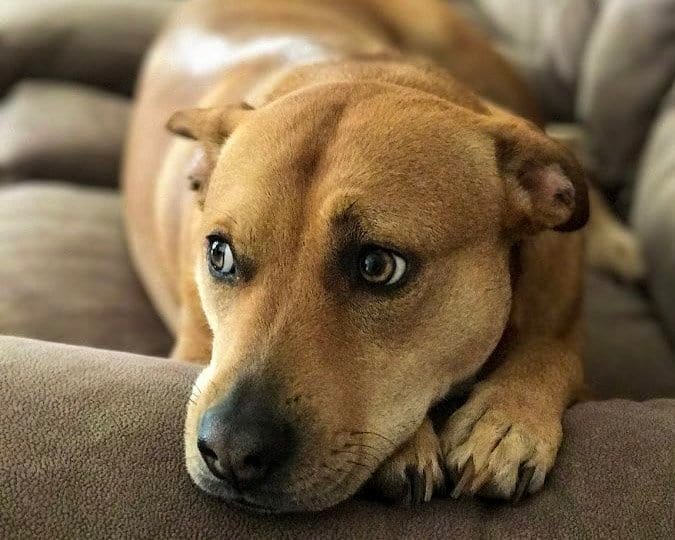Can Dogs Eat Peas and Corn?

There are some affiliate links below, but they are all products I highly recommend. For more info, view my disclosure here.
Dogs are known for their love of food and their willingness to eat just about anything. While it’s important to feed them a healthy and balanced diet, it’s also natural to wonder if it’s okay to share some of our own meals with them. One question that many dog owners have is whether it’s safe for dogs to eat peas and corn.
Read on and we’ll explore the answer to this question and provide some information about the potential benefits and drawbacks of feeding these foods to your dog.
Corn is a well-known vegetable that contains many essential vitamins and minerals. Corn is widely considered safe and healthy for both humans and animals. In fact, you are much likely to see corn in a variety of foods for dogs. A good number of nutritionists opine that feeding your dog corn is not a problem and can be a part of a dog’s diet.
Peas contain essential minerals and are high in protein, are packed with minerals like zinc, iron, potassium, and magnesium. Peas, as an occasional treat or snack for your dog, are a good low-calorie option.

Can Dogs Eat Peas?
Peas are a common ingredient in many dog foods, and they can be a nutritious addition to your dog’s diet in moderation. Peas are a good source of fiber, protein, vitamins, and minerals, including vitamins A, C, and K, and iron. They can help support your dog’s digestion, promote healthy skin and coat, and maintain strong bones.
However, it’s important to note that peas should not be the main source of protein in your dog’s diet. Dogs need a balance of animal-based and plant-based protein, and peas alone may not provide all the nutrients your dog needs.
In addition, some dogs may be sensitive to peas and may experience digestive issues if they eat too many. If you’re considering adding peas to your dog’s diet but are concerned they may have an issue, it’s always a good idea to consult with your veterinarian or a pet nutritionist first.

Can Dogs Eat Corn?
Corn is another common ingredient in dog food, and it can be a good source of energy, fiber, and some vitamins and minerals. However, it’s not a highly nutritious food for dogs, and it should not make up a significant portion of their diet. Corn is primarily made up of simple carbohydrates, which can lead to weight gain and other health problems if consumed in excess.
It’s also important to note that corn can be difficult for dogs to digest, and it can cause digestive issues in some dogs, particularly if they’re not used to eating it. If you’re considering adding corn to your dog’s diet, it’s a good idea to do so in moderation
Can Dogs Eat Peas and Corn?
It’s safe for your dog to be fed corn and peas together. A small quantity of plain, fresh corns and peas won’t hurt or harm your dog in any way. Just ensure that you feed them these things in moderation not daily.
Peas and corn are safe for your dog and also serve as a good source of many essential nutrients and minerals required to ensure good living for your dog.
Read more: Can dogs eat Broccoli Florets?
Can Dogs Eat Frozen Peas?
Yes, dogs can eat frozen peas! You can take frozen peas and cook them without any salt, spices, or other ingredients that could be harmful to dogs. Frozen peas can be a refreshing and healthy snack for dogs on a hot day. Just be sure to serve them in moderation as a treat, not as a meal replacement.
Can Dogs Eat Canned Corn?
Though corn is safe for your dog to eat, canned or tinned corn can be high in sodium. Dogs that constantly feed on foods that are high in sodium will get dehydrated and run the risk of health issues from salt consumption. Feeding your dog canned corn regularly is not safe for dogs unless you select an unsalted brand.
Can Dogs Eat Canned Peas?
Canned peas can be a convenient option for adding peas to your dog’s diet, but it’s important to choose a brand that does not contain any salt or other seasonings.
As with any new food, it’s a good idea to introduce canned peas slowly and in small amounts to make sure your dog can tolerate them and to monitor for any digestive issues.
Can Dogs Eat Peas Pods?
We have different kinds of peas; sugar snap peas, snow peas, and English peas. It’s healthy and safe to give your dogs frozen, fresh, or thawed peas. However, avoid feeding your dog canned peas because they contain ingredients like high salt content which is harmful to dogs. .

Can Dogs Eat Corn On The Cob?
While corn on the cob can be a fun and tasty snack for humans, it is extremely dangerous for dogs to eat. Corn on the cob can cause blockages in the digestive system, leading to serious health problems and can be fatal. In addition, the cob itself can be a choking hazard for dogs.
Can Dogs With Pancreatitis Eat Corn?
Dog pancreatitis is inflammation of the pancreas. It’s caused by stress and diet. Foods that are high in fat and are very processed are hard for your dog to digest. Too much grain and starch shouldn’t be part of your dog’s diet. When you feed your dog canned corn in large quantities, his pancreas has to work harder than it should. This may cause his pancreas to become inflamed further.
Can Great Danes Eat Corn?
Corn can be a part of a Great Dane’s diet, but it should not be the main source of nutrition. Corn is not a highly nutritious food for dogs, and it should not make up a significant portion of their diet. Corn is primarily made up of simple carbohydrates, which can lead to weight gain and other health problems if consumed in excess.
Can Dogs Eat Frozen Corn?
Yes, dogs can eat frozen corn as long as it is not seasoned with any spices or other ingredients that could be harmful to dogs. Frozen corn can be a convenient option for adding this food to your dog’s diet, but it’s important to remember that corn is not a highly nutritious food for dogs, and it should not make up a significant portion of their diet.
Corn is primarily made up of simple carbohydrates, which can lead to weight gain and other health problems if consumed in excess.
In addition, corn can be difficult for dogs to digest, and it can cause digestive issues in some dogs, particularly if they’re not used to eating it.
If you’re considering adding frozen corn to your dog’s diet, it’s a good idea to do so in moderation and to check with your vet first. As with any new food, it’s a good idea to introduce frozen corn slowly and in small amounts, and to monitor for any adverse reactions.
Can Dogs Eat Creamed Corn?
It is generally not recommended for dogs to eat creamed corn or any other food that is high in fat, salt, or other additives. Creamed corn is a processed food that is typically made with a combination of corn, milk, and butter, which can be unhealthy for dogs in large quantities.
These ingredients can be difficult for dogs to digest and can lead to digestive issues, such as diarrhea and vomiting. In addition, high-fat foods like creamed corn can contribute to weight gain and other health problems, such as pancreatitis, in dogs.
Can Dogs Eat Green Beans?
Green beans can be a healthy and nutritious addition to a dog’s diet in moderation. Green beans are a good source of fiber, vitamins, and minerals, including vitamins A, C, and K, and iron. They can help support your dog’s digestion, promote healthy skin and coat, and maintain strong bones.
As above, it’s important to note that green beans should not be the main source of protein in your dog’s diet. Dogs need a balance of animal-based and plant-based protein, and green beans alone may not provide all the nutrients your dog needs.
In addition, some dogs may be sensitive to green beans and may experience digestive issues if they eat too many.
To sum it up, both peas and green beans can be a healthy and nutritious addition to a dog’s diet in moderation. These foods are a good source of fiber, vitamins, and minerals, and they can help support your dog’s digestion, promote healthy skin and coat, and maintain strong bones.
Remember that these foods should not be the main source of protein in your dog’s diet, and some dogs may be sensitive to them and may experience digestive issues if they eat too many.
If you’re considering adding peas or green beans to your dog’s diet, it’s always a good idea to consult with your dog’s veterinarian first and to introduce them slowly and in small amounts.
ABOUT THE AUTHOR

Hi, I’m Natasha!
I’m an active dog rescue advocate and love all things dog! I live in the mountains of Colorado with my husband Dan and our two crazy rescue pups, Roxy & Rico. See more here or reach me hello@sandybrown-deer-747445.hostingersite.com






